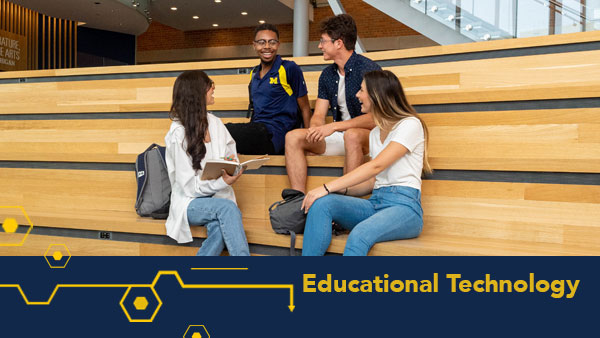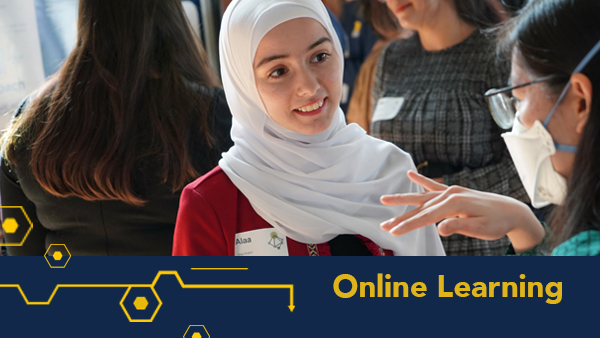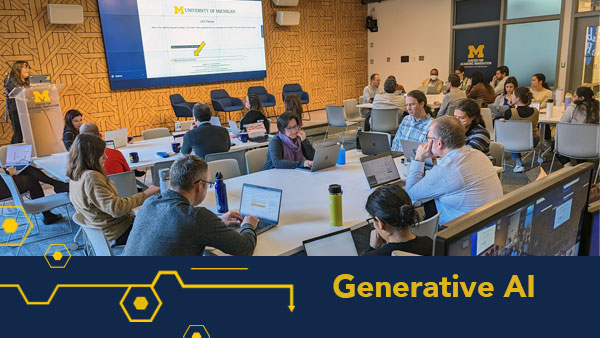James DeVaney, Associate Vice Provost for Academic Innovation
@devaneygoblue
To the University of Michigan community:
Welcome back to campus and to another year filled with possibilities and opportunities to celebrate our past, question our present, and position for the future. At the Office of Academic Innovation we returned from winter break energized by the many opportunities we see for long-term mission-aligned growth. Through launching a rich and interconnected set of experiments, and through campus-wide conversation, we closed 2017 knowing that in order to realize our preferred future, we need to create a vision of it.
That vision focuses on learning first, yet technology and analytics can open and expand the reach and the quality of experience for our diverse communities of learners. Academic innovation is really about embracing an academic R&D mindset. We have an opportunity to turn our research mindset on ourselves. If we embrace experimentation, we’ll ask better and better questions about what works for whom. In so doing, we’ll expand the very definition of the Michigan community by further expanding our reach and creating more inclusive environments within. Ultimately, we’ll help U-M blur the distinction between scholarship and teaching and learning.
Over the past year the Office of Academic Innovation has refined its vision and articulated a preferred future for U-M. In this preferred future, we see new possibilities to redefine the role of the great public research university in the higher education landscape and many opportunities to positively impact pre-college learning, residential learning, global and lifelong learning, and public engagement. Our preferred future for U-M includes:
- An open model for pre-college learning and preparation that broadens access and enhances participation
- A personalized, rigorous, and inclusive model for residential learning grounded in learning analytics and experimentation
- A flexible and networked model for global and lifelong learning that embraces the evolution of a more permeable university
- A participatory and inclusive model for public engagement that accelerates the construction and sharing of new knowledge through public dialogue.
There is much to be excited about in the year ahead. Here are a few highlights in support of these areas of focus:
An open model for pre-college learning and preparation that broadens access and enhances participation
We are designing new courses for pre-college learners, including a MOOC on Computational Thinking, a unique collaboration between faculty from the College of Engineering and the School of Education. We have partnered with the Center for Educational Outreach to lead the Digital Tools and Youth Outreach community of practice, and we are partnering with the Wolverine Pathways program to provide Teach-Outs to middle and high school students.
A personalized, rigorous, and inclusive model for residential learning grounded in learning analytics and experimentation
We are developing new hybrid degree options to create new pathways for learners. Across campus, we see more courses “going gameful” than before, providing new opportunities for residential learners and new opportunities for research. We are offering visiting fellowships for doctoral graduate students who wish to conduct research and development in the area of academic innovation over the summer. We are expanding the use of tools created at U-M, like PolicyMaker, Gradecraft, ECoach, Problem Roulette and ART 2.0, to enhance learning in a wide range of environments across campus.
A flexible and networked model for global and lifelong learning that embraces the evolution of a more permeable university
We are currently building new MOOCs and specializations in areas like statistics, applied data science, and programming, and are exploring opportunities to create agile learning experiences to prepare learners for the future of work. We are expanding our global classroom through our newly created Mentor Academy, and we are expanding access to one of our MicroMasters programs by creating new sessions open to practicing educators, graduate students, faculty members, and reformers across the US and around the world. Through “Writing Jams” we are enhancing the accessibility of course content for global and lifelong learners.
A participatory and inclusive model for public engagement that accelerates the construction and sharing of new knowledge through public dialogue
We are reimagining public engagement. We have reached more than 50,000 public learner participants in our Teach-Out series and we plan to expand this series in 2018 with a Teach-Out launching every two weeks throughout the year. Anytime a member of the public wants to join a conversation about a timely topic of widespread interest, they have an opportunity to do so at Michigan.
Starting next month, we will launch a three-part Teach-Out focused on free speech (in higher education, sports, and journalism) as part of U-M’s campuswide series of events and activities to examine the intersection of free speech and inclusion. Through the Teach-Out series, we hope to extend the reach of this dialogue and invite in diverse perspectives from around the world.
We will create and host Teach-Outs on social justice, AR/VR, privacy, opioids, and universal basic income, all of which connect public learners to U-M’s institutional strategic priorities in the areas of diversity, equity, and inclusion; augmented and virtual reality; data science; precision health; and poverty solutions. We plan to build on the success of the Teach-Out series in 2018 and create new opportunities for two-way public engagement.
Thought partnership through exemplary service
We have made significant progress since establishing the Office of Academic Innovation and have earned the role of thought partner through exemplary service. In order to maintain our momentum and continue to evolve our model for academic R&D, we have reorganized ourselves from a three lab structure to a single-AI model to better meet the needs of our partners across campus and learners in Ann Arbor and around the world.
This new structure simplifies the process of obtaining design-thinking and consultative services for partners across campus. This new model organizes our talented team to further support academic innovation across campus and to address new opportunities for learning at scale, agile curriculum design, and two-way public engagement.
We are in a better position to accelerate pedagogical, programmatic, and business model innovation and long-term mission-aligned growth. We remain a design shop, a makerspace, and an incubator. We continue to be a place to experiment. It is the next step in creating a dynamic model for academic R&D which will immediately allow us to:
- Build and leverage central and distributed capacity to strengthen large scale initiatives while continuing to launch a set of rich and interconnected experiments.
- Design and deliver transformational approaches for leveraging academic innovation to shape the future of education at U-M and beyond.
- Engage the U-M community in communities of practice to address new opportunities for, and constraints that inhibit, growth of academic innovation.
- Balance sustainable growth and operational efficiency in the Academic Innovation model with positive risk-taking and exploration of new opportunity spaces.
We invite faculty to engage with us around projects that will help us move toward our preferred future. Faculty can attend our events, sign up for one-on-one consultations, join (or suggest) communities of practice, and propose new projects.
We are grateful to all our partners across campus and beyond as we shape the future of higher education and look forward to continued collaboration and experimentation in 2018.
Best,
James DeVaney


